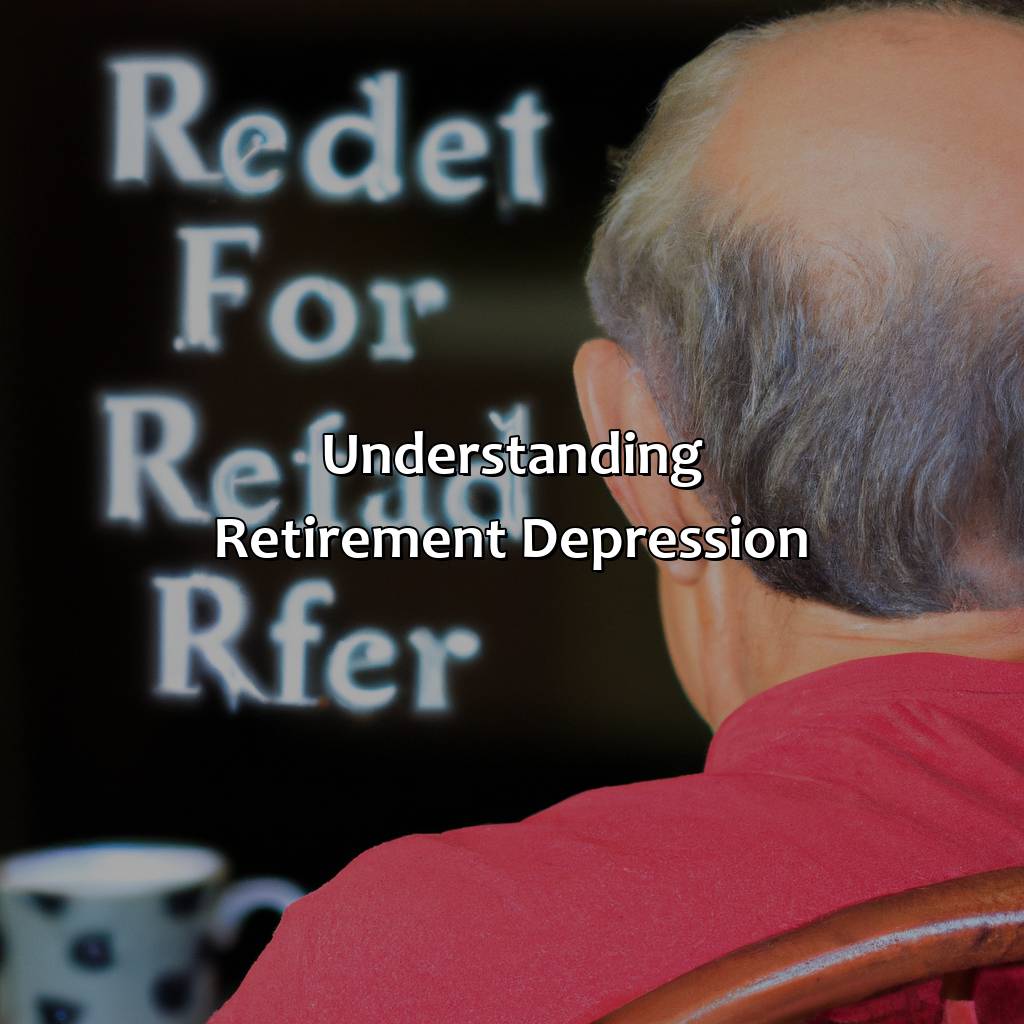How To Cope With Retirement Depression?
Key Takeaway:
- Retirement depression is a common issue that affects many retirees as they adjust to a new lifestyle. It is important to recognize the symptoms of retirement depression, which may include feelings of sadness, anxiety, and isolation.
- Engaging in social activities, pursuing hobbies and interests, and seeking professional help are effective coping strategies for retirement depression. These activities can help retirees stay mentally and emotionally engaged, build new connections, and find meaning in retirement.
- Maintaining a positive outlook and practicing self-care are also essential for coping with retirement depression. By staying optimistic and taking care of their physical and emotional wellbeing, retirees can minimize the negative effects of retirement depression and enjoy their golden years to the fullest.
Are you facing retirement blues? Are you concerned about how you will adjust to a life without a job? Learn how to cope with retirement depression and take charge of your life. You deserve a retirement filled with joy and satisfaction.
Understanding Retirement Depression
Retirement Depression: Understanding and Coping
Retirement depression is a common occurrence among seniors who experience negative emotions after retirement. These feeling can include sadness, loneliness, frustration, and loss of purpose. Retirement depression can be eased by staying active, pursuing hobbies, socializing, and seeking professional counseling if necessary.
It is essential to understand the root causes of retirement depression. The loss of a regular job routine, social connections, and purpose can be overwhelming. Finding new goals and activities can help to overcome these issues. Additionally, staying socially active, volunteering, and joining groups related to interests are great ways to overcome retirement depression.
It is crucial to have a plan for retirement and discuss it with family members, friends, or a therapist. Staying connected to people and family can help ease feelings of depression and loneliness. Furthermore, a structured routine can give retired individuals a sense of purpose and accomplishment.
Pro Tip: Surround yourself with positive thinking individuals and stay active physically and mentally. Taking up yoga or other low-impact exercises can significantly improve your mood.

Image credits: retiregenz.com by Adam Washington
Recognizing the Symptoms
Recognizing Retirement Depression Symptoms: How to Manage It
Retirement depression can manifest in various ways, causing emotional distress, anxiety, loss of motivation, and even physical symptoms. It is essential to recognize and acknowledge these symptoms in oneself or loved ones. Symptoms could include:
- a sudden shift in mood
- sleep disturbance
- lack of interest in activities
- withdrawal from social life
- decreased energy
- appetite changes
- difficulty concentrating
To manage the symptoms of retirement depression, one should consult a mental health professional, stay active, engage in hobbies, reconnect with old friends, establish new social connections, and join support groups. Additionally, practicing self-care, adhering to a healthy lifestyle, and seeking emotional support from family members can significantly help combat depression.
A vital aspect of managing retirement depression symptoms is acknowledging and accepting the situation. Some retirees may feel embarrassed to express their emotions, viewing retirement depression as a sign of weakness or failure. However, seeking professional help and confiding in trusted loved ones can enable retirees to take control of their emotional wellbeing and transition towards a fulfilling life in retirement.
Pro Tip: Reminding oneself of their accomplishments and positive contributions to the past can help them find meaning and purpose in retirement.

Image credits: retiregenz.com by Yuval Arnold
Coping Strategies
Retirement Coping Mechanisms
The transition from a busy work life to retirement can be overwhelming, leading to depression and anxiety. Below are strategies to cope with retirement depression:
- Keep a Routine
Maintaining a routine fosters a sense of purpose and keeps one engaged. Creating a schedule with enjoyable activities will help ease anxiety. - Stay Active
Physical activities like exercise, yoga, and sports not only keep you healthy but also release endorphins that make you feel good. Socializing and volunteering are other ways to stay engaged. - Emotional Support
Sometimes, talking to someone helps to alleviate feelings of depression. Conversations with loved ones, retirement support groups, or a therapist can be beneficial.
Pro Tip:
Retirement is an opportunity to explore new things. Don’t be afraid to try out new hobbies and experiences. It’s the perfect time to indulge in what you love.

Image credits: retiregenz.com by James Arnold
Maintaining a Positive Outlook
Maintaining a positive mindset is crucial in countering the effects of retirement depression. By focusing on new opportunities and cultivating meaningful relationships, one can combat negative thinking. Re-evaluating personal values and setting realistic goals can also enhance feelings of fulfillment and satisfaction. Develop a strong support system to achieve this and overcome any challenges that arise.
A Pro Tip would be to engage in physical activities or engage in hobbies as this can contribute positively to one’s mental health.

Image credits: retiregenz.com by James Duncun
Importance of Self-Care
Self-Care’s Significance for Coping with Retirement Depression
Taking care of oneself is pivotal in managing retirement depression. Self-care includes activities to enhance mental, physical, and emotional well-being. It leads to better self-esteem, sense of purpose, and positive outlook towards life, and reduced stress. Engage in healthy routines, indulge in hobbies, connect with friends and family, go for nature walks, eat healthily, meditate, and seek professional help if needed.
Incorporating self-care activities can help overcome negative feelings and create a sense of control during retirement. It can prevent social isolation and physical inactivity, which can lead to depression. Self-care allows one to reconnect with interests and goals that may have been neglected during their professional life.
The elderly often fear missing out on life experiences, and retirement depression can amplify that fear. Engaging in self-care activities not only reduces the risk of depression but also promotes an active and fulfilling life. Take control of retirement years by prioritizing self-care, leading to an invigorating and fulfilling experience.

Image credits: retiregenz.com by Joel Arnold
Five Facts About Coping With Retirement Depression:
- ✅ Retirement can trigger depression due to loss of identity, routine, and social connection. (Source: AARP)
- ✅ Staying physically active can help alleviate symptoms of depression and promote overall well-being. (Source: Mayo Clinic)
- ✅ Engaging in meaningful activities, such as volunteering or pursuing hobbies, can provide a sense of purpose in retirement. (Source: Healthline)
- ✅ Seeking professional help, such as therapy or counseling, can be an effective way to cope with depression in retirement. (Source: Retirement Living)
- ✅ Building a strong support network of family and friends can also help combat feelings of loneliness and isolation in retirement. (Source: Verywell Mind)
FAQs about How To Cope With Retirement Depression?
What is retirement depression, and how to cope with it?
Retirement depression is a common emotional state that a person might experience after retiring from a job. Coping with it involves adopting healthy habits, staying active, socializing, and seeking professional help if needed.
What are the signs and symptoms of retirement depression?
The signs and symptoms of retirement depression may include feelings of sadness, hopelessness, irritability, fatigue, loss of appetite, difficulty sleeping, lack of interest in activities, social withdrawal, and a decline in overall self-esteem.
How can staying active help in coping with retirement depression?
Staying active can help in coping with retirement depression by boosting physical and mental health. Engaging in regular exercise, pursuing hobbies, volunteering, and learning new skills can all help to provide a sense of purpose and fulfillment for retirees.
Is socialization crucial in overcoming retirement depression?
Yes, socialization is crucial in overcoming retirement depression. Socializing with friends and family, joining clubs or groups of interest, and even attending community events can help maintain social connections and prevent feelings of isolation and loneliness.
What role does mental health counseling play in combatting retirement depression?
Mental health counseling can play a crucial role in combatting retirement depression. A trained therapist can help retirees work through their emotions, identify negative thought patterns, and develop coping strategies to promote emotional resilience and overall well-being.
What are some self-help tips for coping with retirement depression?
Some self-help tips for coping with retirement depression include setting small goals, practicing mindfulness meditation, maintaining healthy sleep patterns, eating a balanced diet, and finding ways to stay engaged and fulfilled.




